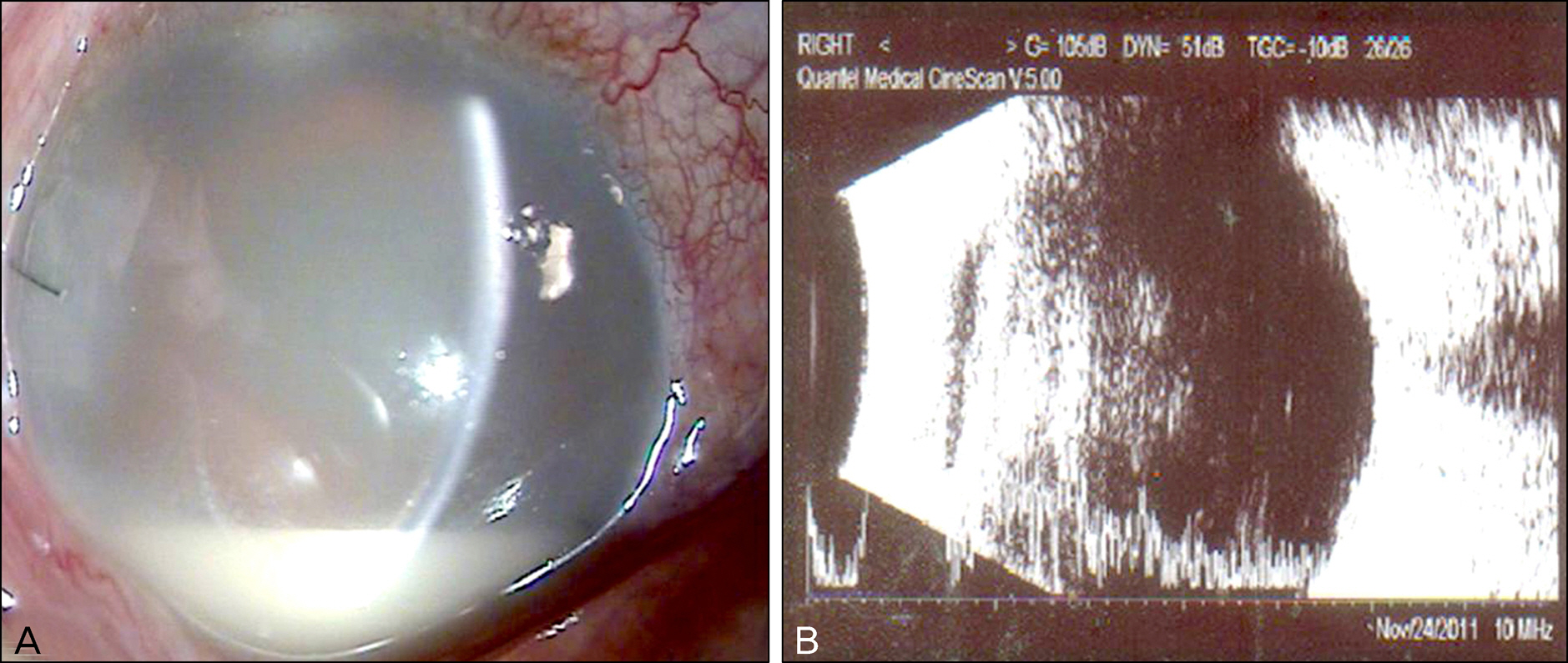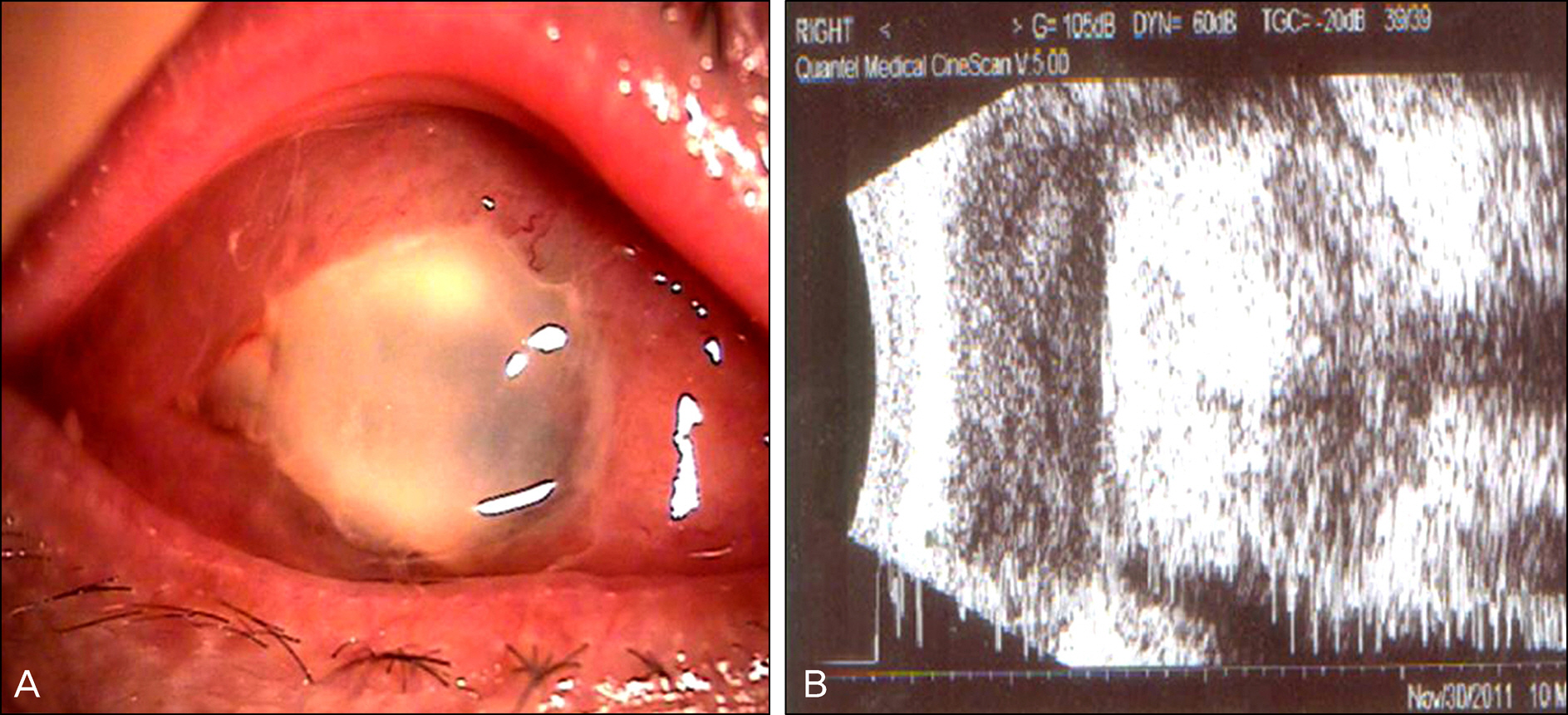J Korean Ophthalmol Soc.
2013 Oct;54(10):1605-1609.
A Case of Corneal Perforation and IOL Prolapsed in Serratia Marcescens Endophthalmitis after Cataract Surgery
- Affiliations
-
- 1Department of Ophthalmology, Dankook University Medical College, Cheonan, Korea. changmh@dankook.ac.kr
Abstract
- PURPOSE
To report a case of Serratia marcescens endophthalmitis following phacoemulsification and posterior chamber intraocular lens implantation.
CASE SUMMARY
A 64-year-old male with a history of diabetes, hypertension, cardiovascular disease was referred with right ocular pain and reduced vision 1 day after cataract surgery. On admission, hypopyon on anterior chamber by slit lamp examination and anterior vitreous was hazy according to ultrasonography. We immediately performed intravitreal antibiotics injection and microbiological analysis of anterior chamber and vitreous samples was performed. On day 3, persistent cornea stormal infiltration and cornea perforation were visible and the organism was identified as S. marcescens. Despite appropriate antibiotic treatment the eye continued to deteriorate.
CONCLUSIONS
S. marcescens endophthalmitis was diagnosed and treated immediately, but rapid progression and outcome were unsatisfactory.
Keyword
MeSH Terms
Figure
Reference
-
References
1. Kresloff MS, Castellarin AA, Zarbin MA. Endophthalmitis. Surv Ophthalmol. 1998; 43:193–224.
Article2. Shrader SK, Bank JD, Lauter CB, Murphy P. The clinical spectrum of endophthalmitis: incidence, predisposing factor, and features in-fluencing outcome. J Infect Dis. 1990; 162:115–20.3. Gaughran ER. From supersitition to science: the history of a bacterium. Trans NY Acad Sci. 1969; 31:3–24.4. Equi RA, Green WR. Endogenous Serratia marcescens endophthalmitis with dark hypopyon: a case report and review. Surv Ophthalmol. 2001; 46:259–68.5. Jonson DH, Klein NC, Cunha BA. Postoperative Serratia marcescens endophthalmitis. Heart Lung. 1992; 21:300–2.6. Shaarawy A, Meredith TA, Kincaid M. . Intraocular injection of ceftazidime. Retina. 1995; 15:433–8.
Article7. Endophthalmitis Vitrectomy Study Group. Results of the Endophthalmitis Vitrectomy Study: a randomized trial of immediate vitrectomy and intravenous antibiotics for the treatment of postoperative bacterial endophthalmitis. Arch Ophthalmol. 1995; 113:1479–96.8. Alexandrakis G, Alfonso EC, Milller D. Shifting trends in bacterial keratitis in south Florida and emergind resistance to fluoroquinolones. Ophthalmology. 2000; 107:1497–502.9. Lee SH, Woo SJ, Park JH. . Serratia marcescens endophthalmitis associated with intravitreal injections of bevacizumab. Eye (Lond). 2010; 24:226–32.
Article10. al hazzaa SA, Tabbara KF, Gammon JA. Pink hypopyon: a sign of Serratia marcescens endophthalmitis. Br J Ophthalmol. 1992; 76:764–5.
Article11. Lyerly D, Gray L, Kreger A. Characterization of rabbit corneal damage produced by Serratia keratitis and by a serratia perotease. Infect Immun. 1981; 33:927–32.12. Choi SH, Kim YS, Chung JW. . Serratia bacteremia in a large university hospital: trends in antibiotic resistance during 10 years and implications for antibiotic use. Infect Control Hosp Epidemiolo. 2002; 23:740–7.13. Kumar N, Grandhewar R, Khan MY. Serratia marcescens endophthalmitis after cataract surgery despite vancomycin and gentamicin in irrigation fluid. Can J Ophthalmol. 2004; 39:778–9.
Article14. Cohen SM, Flynn HW Jr, Miller D. Endophthalmitis caused by serratia marcescens. Ophthalmic Surg Lasers. 1997; 28:195–200.
Article
- Full Text Links
- Actions
-
Cited
- CITED
-
- Close
- Share
- Similar articles
-
- A Case of Endophthalmitis after Laser in situ Keratomi leusis[LASIK]
- Corneal Perforation with Preseptal Cellulitis in a Patient with Acute Lymphocytic Leukemia
- Serratia Marcescens Keratitis
- A Case of Alcaligenes xylosoxidans Endophthalmitis after Cataract Extraction
- Skin Infection Caused by Serratia marcescens in an Immunocompetent Patient with Hidradenitis Suppurativa




